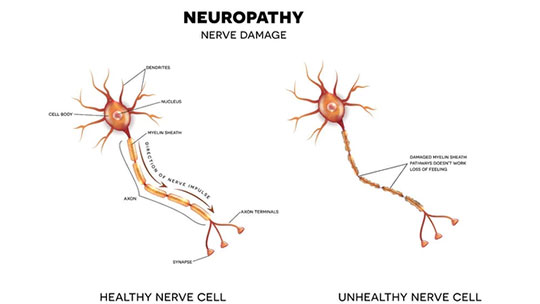Peripheral Neuropathy
Peripheral Neuropathy is a condition where a person’s peripheral nerves have been damaged. These nerves carry information from the brain to the arms and legs. Often a person suffering from Peripheral Neuropathy will lose sensation in his or her toes and feet making it difficult to tell if he or she has stepped on something sharp or injured the foot. Patient’s may also experience “burning” pain.
WHAT CAUSES PERIPHERAL NEUROPATHY?
Peripheral Neuropathy is usually caused by:
- Genetics
- Diabetes
- Trauma to the foot or leg
- Vitamin B deficiencies
- An underactive thyroid
- Idiopathic (meaning no cause is found)
HOW DO I KNOW IF I HAVE PERIPHERAL NEUROPATHY?
WHAT ARE THE SYMPTOMS OF PERIPHERAL NEUROPATHY?
The most common symptoms of Peripheral Neuropathy include:
- Tingling sensation in your foot or toes
- Loss of feeling in your foot or toes
- Numbness and/or pain (pain is often described as “burning”)
- Weak muscles.
HOW IS PERIPHERAL NEUROPATHY DIAGNOSED?
Peripheral Neuropathy is diagnosed through a physical and neurological exam. Your doctor will want to know about your medical history and your family’s medical history. He or she may order an MRI, blood tests, and EMG/nerve conduction study.
WHAT CAN I DO FROM HOME FOR PERIPHERAL NEUROPATHY?
WHAT CAN I DO TO PREVENT PERIPHERAL NEUROPATHY?
If your Peripheral Neuropathy is not caused by genetics then you can prevent it or slow it’s progression by:
- Managing diabetes
- Avoid or moderate your intake of alcohol
- Manage your weight
- Making sure the underlying cause is well-managed (eg. hypothyroidism or B12 deficiency)
WHAT TREATMENTS CAN I DO FROM HOME FOR PERIPHERAL NEUROPATHY?
There are several things you can do from home to help ease the symptoms and manage Peripheral Neuropathy including taking care of your feet. This includes:
- Making sure your shoes fit properly and aren’t too tight and don’t cause blisters
- Checking your feet on a daily basis for calluses, blisters, or dry patches
- Keeping your blood sugar under control
- Keeping your floors clear of obstacles such as bunched rugs or wires stretching across your floor. This will reduce your chances of tripping.
WHEN SHOULD I SEE A DOCTOR FOR PERIPHERAL NEUROPATHY?
You should see a doctor as soon as you suspect you have Peripheral Neuropathy. The sooner you are diagnosed the sooner you will receive proper medical treatment.
TREATMENTS YOUR DOCTOR MAY RECOMMEND FOR PERIPHERAL NEUROPATHY
Non-Surgical:
Non-surgical solutions for Peripheral Neuropathy include:
Medications that target neuropathic pain are available (both topically and orally). Spinal Cord Stimulators are also available for severe cases that do not respond to more conservative treatments.

